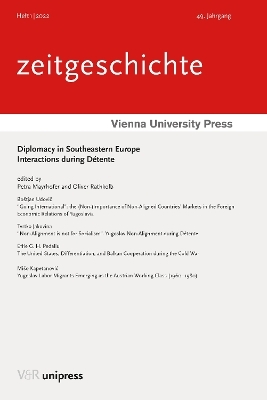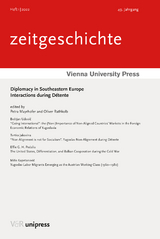Diplomacy in Southeastern Europe
Interactions during Détente
Seiten
2022
|
1. Edition 2022
V&R unipress (Verlag)
978-3-8471-1410-9 (ISBN)
V&R unipress (Verlag)
978-3-8471-1410-9 (ISBN)
A Comprehensive Survey of Yugoslav Foreign Policy during Cold War Détente
This issue of zeitgeschichte off ers a comprehensive survey of aspects of Yugoslav foreign policy during Cold War détente. Due to its geostrategic location on the Balkan peninsula, Yugoslavia became an important focus for the U.S.S.R. and the United States during the East-West confl ict. After the break with Stalin in 1948, the Yugoslav "leader" Tito sought to position Yugoslavia as a non-aligned state on the international level and played a hegemonic role in the Non-Aligned Movement (NAM). The articles analyze Yugoslav policy in the 1960s and 1970s, examining its intentions, its developments, its strategic advantages, and its limits in the context of (geo-)political, economic, and cultural circumstances, with a focus on non-alignment as a leitmotiv of Yugoslav political ambitions, political and economic relations between Yugoslavia and countries of the NAM, the role of the Balkans in U.S. Cold War policy, and aspects of Yugoslav labor migration.
This issue of zeitgeschichte off ers a comprehensive survey of aspects of Yugoslav foreign policy during Cold War détente. Due to its geostrategic location on the Balkan peninsula, Yugoslavia became an important focus for the U.S.S.R. and the United States during the East-West confl ict. After the break with Stalin in 1948, the Yugoslav "leader" Tito sought to position Yugoslavia as a non-aligned state on the international level and played a hegemonic role in the Non-Aligned Movement (NAM). The articles analyze Yugoslav policy in the 1960s and 1970s, examining its intentions, its developments, its strategic advantages, and its limits in the context of (geo-)political, economic, and cultural circumstances, with a focus on non-alignment as a leitmotiv of Yugoslav political ambitions, political and economic relations between Yugoslavia and countries of the NAM, the role of the Balkans in U.S. Cold War policy, and aspects of Yugoslav labor migration.
Prof. Dr. Oliver Rathkolb lehrt am Institut für Zeitgeschichte der Universität Wien und ist Vorsitzender des Internationalen Wissenschaftlichen Beirats des Hauses der Geschichte Österreich (HGÖ).
Petra Mayrhofer ist Zeithistorikerin und wissenschaftliche Mitarbeiterin am Institut für Zeitgeschichte der Universität Wien.
| Erscheinungsdatum | 15.02.2022 |
|---|---|
| Co-Autor | Mišo Kapetanović, Oliver Rathkolb, Petra Mayrhofer, Effie Pedaliu, Boštjan Udovič, Tvrtko Jakovina |
| Zusatzinfo | with 9 figures |
| Verlagsort | Göttingen |
| Sprache | englisch |
| Maße | 155 x 230 mm |
| Gewicht | 207 g |
| Themenwelt | Geschichte ► Allgemeine Geschichte ► Zeitgeschichte |
| Sozialwissenschaften ► Politik / Verwaltung ► Staat / Verwaltung | |
| Wirtschaft ► Volkswirtschaftslehre ► Wirtschaftspolitik | |
| Schlagworte | Außenpolitik • Balkan • Bewegung der blockfreien Staaten • Entspannung • Export • Josip Broz Tito • Jugoslawien • Kalter Krieg • Österreich • Politik • USA • Wirtschaft • Wirtschaftsbeziehungen |
| ISBN-10 | 3-8471-1410-7 / 3847114107 |
| ISBN-13 | 978-3-8471-1410-9 / 9783847114109 |
| Zustand | Neuware |
| Haben Sie eine Frage zum Produkt? |
Mehr entdecken
aus dem Bereich
aus dem Bereich
Gewalt, Umwelt, Identität, Methode
Buch | Softcover (2024)
Spector Books OHG (Verlag)
36,00 €
wie Freud im Kollektiv verschwand
Buch | Hardcover (2024)
Klett-Cotta (Verlag)
25,00 €




